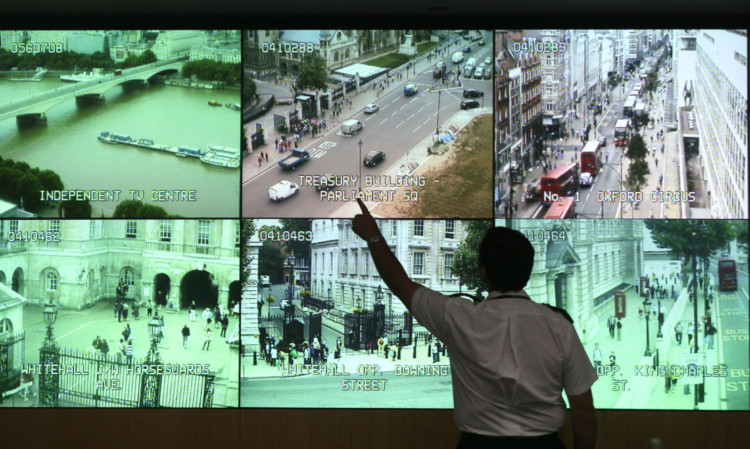
Britain is one of the most watched nations on Earth with CCTV cameras across the land.
Many of us were laughed at when we said we feared the internet would invade our privacy now, those who scoffed should be apologising.
Britain is already one of the most highly-scrutinised nations on Earth, with CCTV and other kinds of cameras watching every move we make.
New cameras at traffic lights, inside apartment blocks, on subway and train stations and throughout high street stores all add to the feeling that we’re never as alone as we’d like.
And, as for the internet, it seems that everyone who felt it was just one more way to keep tabs on us might have been right.
A new book by David Houle, entitled Privacy Is Dead, pretty much sums up where we are now in terms of having secrets.
And, short of stashing your diaries in the loft or keeping your cash under the bed, it shows that almost everything in life can now be observed by a complete stranger.
A so-called Futurist, American Houle has given thousands of talks about the future to business bosses and companies worldwide.
He reckons that the advent of internet, email, webcams, social media and so on means there’s precious little we can hide.
Whatever your feelings about Edward Snowden, the former CIA computer expert who became a whistleblower, his revelations have been truly gobsmacking. Even to some leaders of the Western world!
Snowden, of course, had to go into hiding in Russia and is still there, knowing the US would give anything to get him into a courtroom.
Like the rest of us, German Chancellor Angela Merkel has been left open-mouthed as his revelations come dripping out, each one bringing more disapproval towards the USA and UK.
Merkel was raging when she learned America had been spying on her phone calls.
Apart from our own country and those we share that “special relationship” with, only the likes of Australia and Canada seem to have been in the know about what was going on.
Some reckon that every single email, phone call and text message we’ve ever made has been traced by them.
Oh, and not forgetting every website we visit, and the potential that bank codes and other highly-confidential info have been seen by someone in Washington, London or elsewhere. And they say this is just the tip of the iceberg.
Just think about all those family letters, love letters, rants on the phone about the Government, your boss, the noisy neighbour next door in our grandparents’ or even parents’ day, they were all pretty much private.
Today, it seems, those with a mind to can find out your politics, your taste in clothes, what you do with your money, who you fancy yes, perhaps your deepest, darkest secrets!
Says one expert: “Tablets, smartphones, browsers, video surveillance cameras everywhere, ATMs and all forms of digital records and communications that we so embrace basically are eliminating privacy as it has been defined for centuries.”
For many, the big question is, how do we “trade off” the value of our nation’s security against our own personal privacy?
How much are we happy for the powers-that-be to know about us, and do they really need to see every little thing we do and say, in order to protect us from terrorists?
And, as they’ve been spying on us for years now, how come terrorists have still managed to strike at the Twin Towers, the London Tube or Glasgow Airport?
Of course, they’d need millions of staff to thoroughly analyse every single text message and email there’s so much stuff, the snoopers simply can’t keep up, which is why some extremists are missed.
The word “privacy” is not in the Constitution of the United States.
The Fourth Amendment states: “The right of the people to be secure in their persons, houses, papers and effects, against unreasonable searches and seizures, shall not be violated.”
Yes, unless our leaders change their minds, apparently! Of course, those noble words were written long before the internet, before the telephone was commonplace and 200 years before mobile phones.
“If you use a smartphone, log onto the internet, drive a car, walk down a street or use any card that swipes your information, it means others know what you do,” says the expert.
“This is the world we live in. It’s time to accept this reality, happily or not, and move on to how we change our morality, ethics and social contracts, in such ways that will allow freedom and democracy.”
President Obama, who claims much of this surveillance was done before his time and that he didn’t know its extent, has phoned Angela Merkel, French leader Francois Hollande and others to apologise and try to heal the wounds.
Many Germans, still haunted by memories of East Germany’s secret police, the Stasi, would like to see Obama in court. Hollande has admitted it will be well-nigh impossible to totally trust the USA ever again.
Our own PM has said bluntly that keeping us safe is the bottom line, which seems to suggest we’ll just have to put up with being watched, rather like in George Orwell’s infamous Big Brother world.
For many people who for years have feared the worst from this modern, internet age, it has all come true and there really is nowhere to hide.

Enjoy the convenience of having The Sunday Post delivered as a digital ePaper straight to your smartphone, tablet or computer.
Subscribe for only £5.49 a month and enjoy all the benefits of the printed paper as a digital replica.
Subscribe